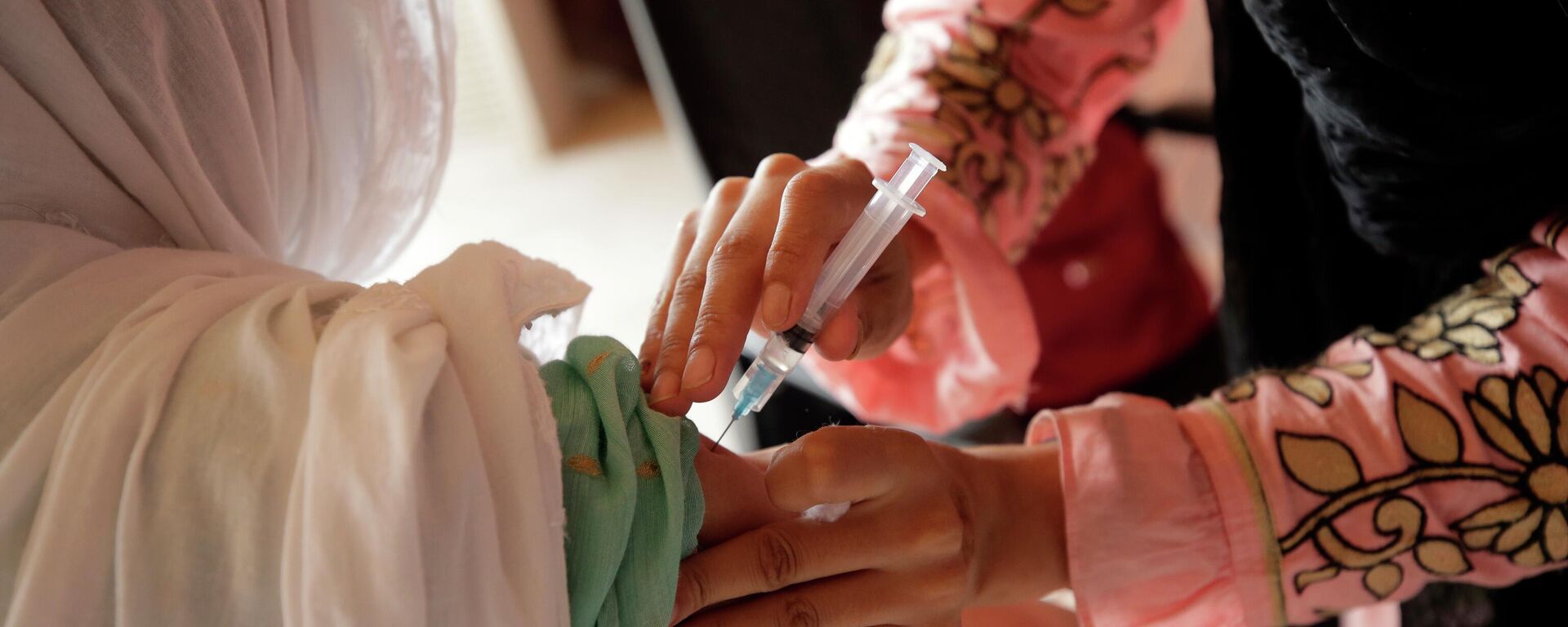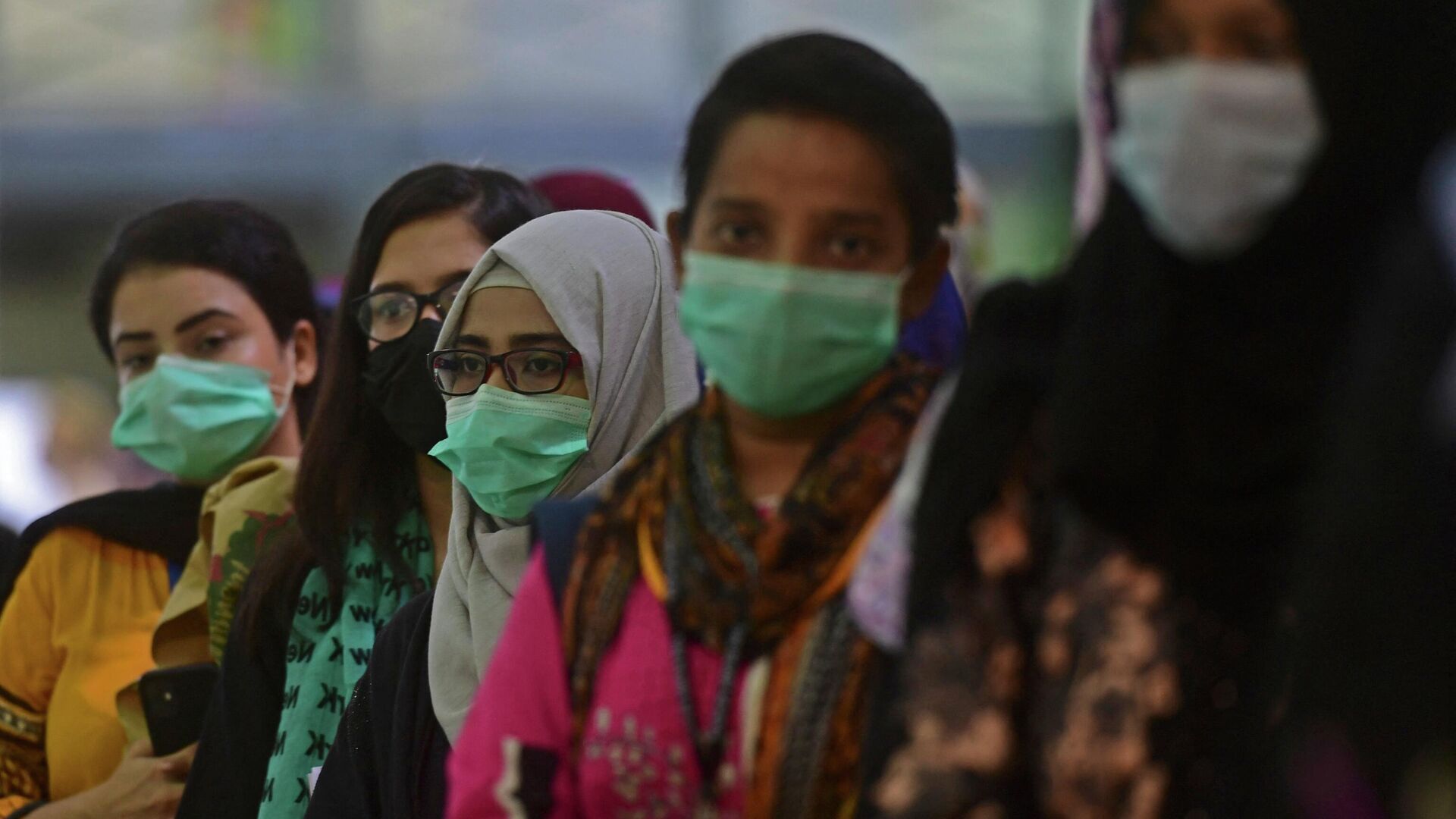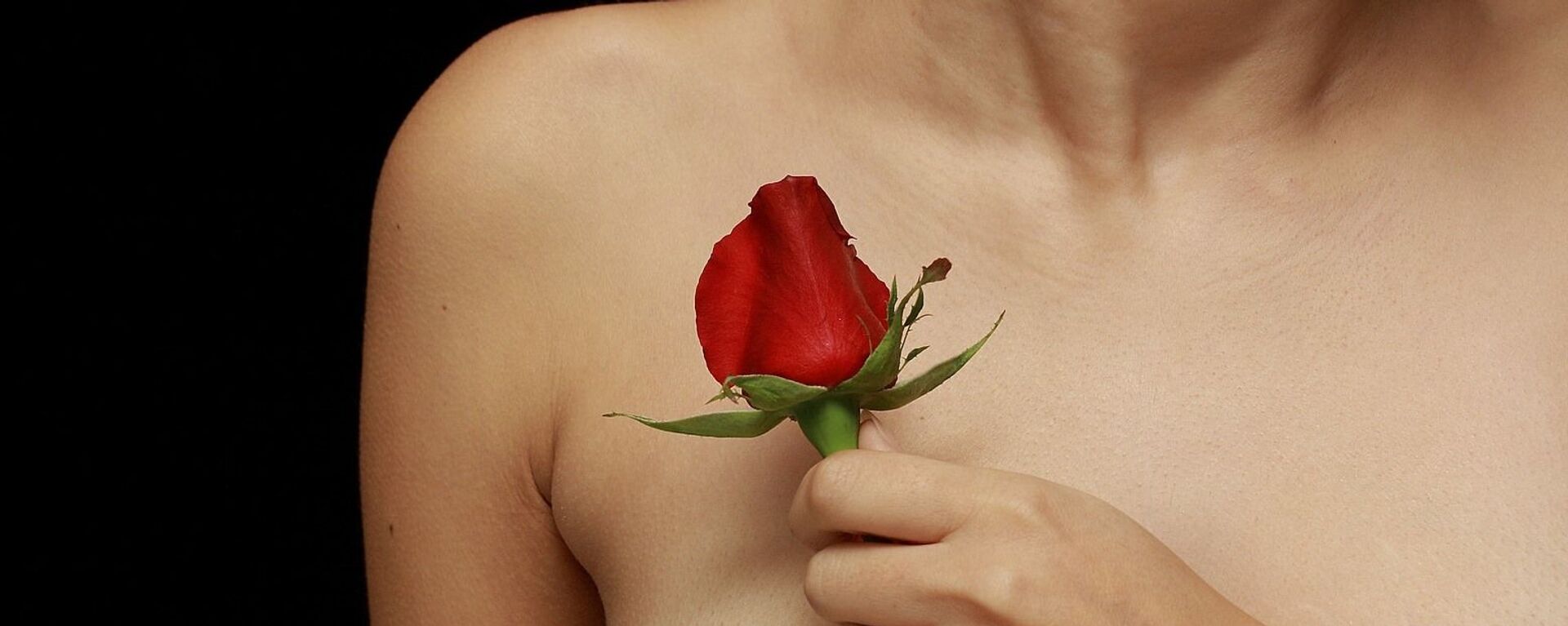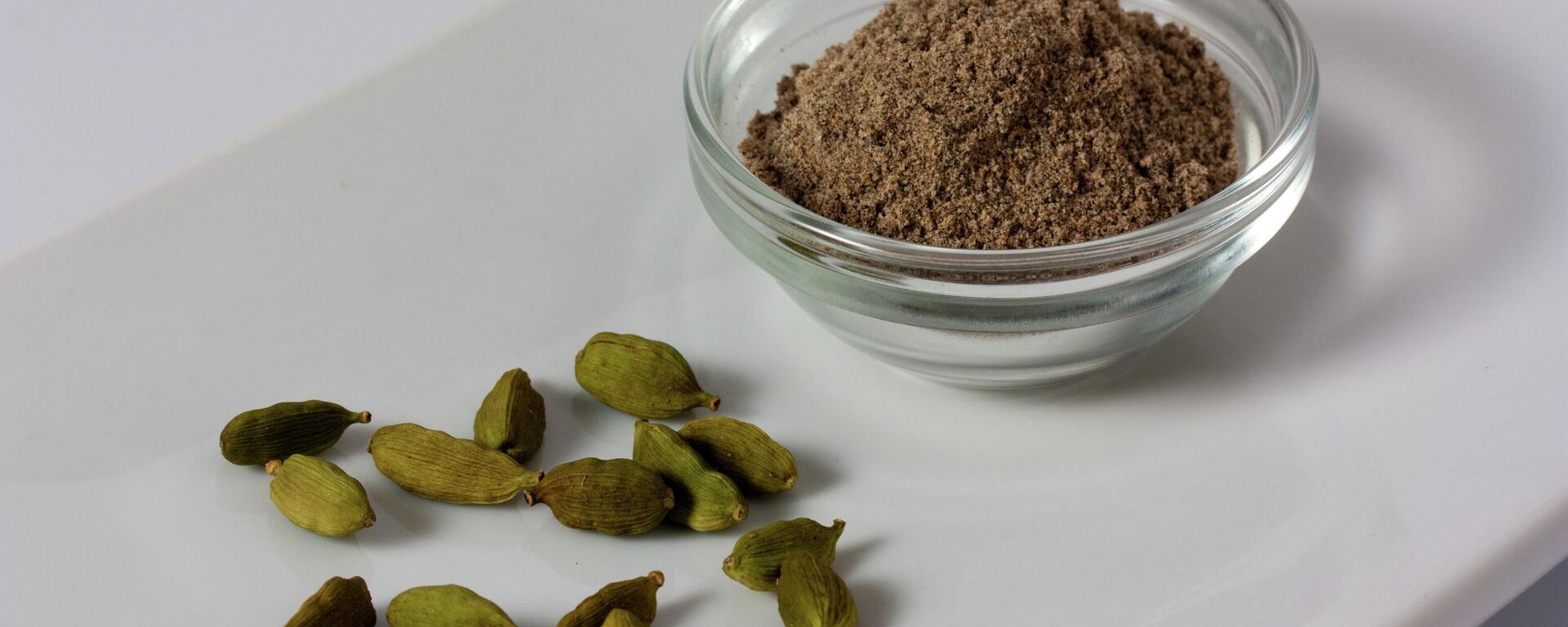https://sputnikglobe.com/20221105/breaking-the-stigma-how-cultural-taboos-prevent-breast-cancer-treatment-in-pakistani-women-1103813438.html
Breaking the Stigma: How Cultural Taboos Prevent Breast Cancer Treatment in Pakistani Women
Breaking the Stigma: How Cultural Taboos Prevent Breast Cancer Treatment in Pakistani Women
Sputnik International
In a conservative country like Pakistan, fighting breast cancer often means fighting taboos. As breast cancer cases rise, the country faces a lot of challenges... 05.11.2022, Sputnik International
2022-11-05T14:46+0000
2022-11-05T14:46+0000
2022-12-08T18:03+0000
world
breast cancer
public awareness
rural
urban
medicine
taboo
pakistan
https://cdn1.img.sputnikglobe.com/img/07e6/0b/05/1103814464_0:81:3073:1809_1920x0_80_0_0_c8c76dce6dded934bd14d3f4b4f16c35.jpg
October is international breast cancer awareness month. Pink ribbons symbolize awareness for this disease, and were seen in big cities across Pakistan last week. Some of the main government buildings, such as the Supreme Court in Islamabad, were lit pink in solidarity with breast cancer victims.In Pakistan, one in nine women is at risk of being diagnosed with breast cancer during their lifetime. It is estimated that more than 83,000 cases of breast cancer are reported each year and about 40,000 women die as a result of this condition.Although men can also get breast cancer, they make up less than one percent of all cases globally. The vast majority of breast cancer patients are women.In the last few years, famous Pakistani women who have battled breast cancer, such as actress Nadia Jameel, politician Fehmida Mirza and Punjab's former health minister, Dr. Yasmeen Rashid took to social media to share their predicament and stress the importance of getting timely medical help.There are many more female celebrities who had bravely faced breast cancer and educated the masses about it, but didn't survive. Nevertheless, their inspiring stories help other women realize the importance of self-examination, as well as having timely mammograms and medical check ups.Hospitals such as Shaukat Khanum, which was inaugurated by former prime minister Imran Khan in Lahore in 1994 and is dedicated to his mother, who died of cancer, has helped save many lives. Treatment at this hospital is free of charge for 75% of the patients, especially low-income people. The hospital offers a comprehensive care facility dedicated to the diagnosis and the highest standards of treatment for cancer. People from all over the world provide donations to Shaukat Khanum for patients who can’t afford the treatment.Other hospitals that treat breast cancer in the country include: Bait-ul-Sukoon, the Cancer Foundation Hospital, the Nuclear Medicine Oncology and Radiotherapy Institute, the Institute of Nuclear Medicine and Oncology, and Aga Khan University.Despite the valiant efforts of top oncologists working in these hospitals, there are still some problems regarding access to cancer care in the country.A Drug Shortage and Inadequate TechA recently conducted cross‐sectional survey across Punjab province showed that there is a shortage of anti-cancer medicine. There are several reasons for that: the raw material used to make these drugs does not reach the country; in comparison to high demand the supply is low and there are inconsistent supply lines. Furthermore, prices for these drugs are quite high because of the low supply.There is also a huge shortage of radiotherapy facilities and cancer pain management medication due to opiod-phobia. The survey suggests that only 21.4% of patients have access to radiotherapy services.Hence, the inadequate facilities related to cancer treatment act as a deterrent for people to seek treatment, especially the rural population, because they have to travel to big cities to get help. In terms of breast cancer there are many other socio-cultural factors that stop people from seeking timely treatment.In Pakistan, there are still serious cultural taboos surrounding breast cancer. A number of qualitative studies have sought to explore these taboos that hinder women from talking to a doctor. Through conducting hundreds of interviews with women in both urban and rural parts of the country, these studies identified various factors that contribute to the health crisis.Plethora of socio-economic and cultural factorsIn Pakistan, 89% of breast cancer patients are diagnosed at a later stage and 59% at an advanced stage due to lack of awareness of the disease.Many women do not know anything about breast cancer as they have not received a formal education and there are not enough awareness campaigns within the country regarding the topic.In a conservative Islamic country like Pakistan, it is a taboo to talk about breasts as they are perceived as sexual organ and women shy away from talking about it even with their family members. Many women, especially in rural areas, upon finding a lump in their breast, tend to ignore it and not tell anyone for months. When the disease progresses and they are forced to visit a doctor, it is often too late.Due to lack of awareness, very few women know about breast cancer screening, while the majority of women know nothing about breast self-exam methods.There is also a huge misconception amongst people regarding cancer, as many think that it is a contagious disease, so admitting to having cancer can turn them into pariahs within their community. Hence, women tend to be afraid to admit that there is something wrong with them.Another cultural issue is that breast cancer is perceived as a death sentence and women feel that they have no solution to their medical issue as they consider it to be a punishment from Allah.Although every breast cancer case is different, according to Web MD the overall 5-year relative survival rate for breast cancer is 90%. This means 90 out of 100 women are alive 5 years after they’ve been diagnosed with breast cancer. However, that is if the treatment starts as early as possible, meaning the cancer is at Stage 1 or 2. The survival rate drops at later stages.Furthermore, Pakistani women generally have very strong religious beliefs and medical concerns are oftentimes addressed through prayers and spiritual healers. It is culturally accepted to seek treatment by spiritual spells (Dam-Darood) and recite some specific verses of the Quran for healing. Women also tend to seek 'cures' by going to fake doctors or quacks, who prescribe holy water, homeopathy or basic painkillers.According to another study, 40.7% of Pakistani women wasted their time using alternative medicines, 17.1% ignored painless lumps and 10.6% appealed for help too late because they considered the breasts a secret organ.Another major cultural factor that stops women from going in for a check up is the fact that male doctors predominate in the country. A Pakistani woman is uncomfortable exposing her body to an unknown man, and even partial nakedness is absent in the country's culture. If a woman's cleavage is visible in her clothing - it is deemed vulgar by society, so showing her breasts to another man, even a male doctor, is extremely difficult for an average Pakistani woman.Hence, there is a dire need for more female oncologists in Pakistan who can make a woman feel comfortable and gain her confidence.In another study it was revealed that women are fearful of the treatment's side effects such as: hairlessness and the loss of eyebrows and eyelashes. They perceived this as a disfiguration of their body image and some women, on purpose, delayed the treatment because of such fears.Furthermore, there is psychological pressure associated with getting a mastectomy, which some women viewed as a loss of their femininity, which also prevented them from seeking timely treatment.In Pakistan, like many other developing countries, there is little medical assistance from the government for patients suffering from cancer. In many cases, most of the treatment cost is handled by the patient and his/her family.Hence, aside from cancer awareness and cultural issues, a majority of patients, especially from rural areas, report late because of financial constraints as they believe that treatment will be unaffordable for them.Health insurance is also not common and most women in Pakistan remain economically dependent on their husbands throughout their lives.Breaking the StigmaOverall, there are multifaceted barriers in Pakistan to breast cancer diagnosis and treatment, including individual, socio-cultural and financial ones.Thus, serious educational interventions are needed to raise awareness about breast cancer. Breast health programs should be introduced at provincial levels so that the death rate of cancer can be minimized. It is vital for these programs to stress that early detection often leads to women being completely cured.Furthermore, breast cancer should be talked about openly in the media and literature so that both urban and rural dwellers could break the taboo around it and have proper information about the disease.Organizations such as Pink Ribbon should be supported in their efforts and local celebrities should take it upon themselves to educate the masses through their social media presence. NGOs may work together with hospitals to provide various incentives for patients to come in for a check-up.Basically massive awareness campaigns on both electronic and print media are needed to break all socio-cultural stigmas associated with breast cancer, urging Pakistani women to prioritize their health.The views expressed in this column are those of the author and do not necessarily reflect the position of Sputnik.
https://sputnikglobe.com/20220617/uks-healthcare-system-approves-new-effective-breast-cancer-drug---reports-1096404300.html
https://sputnikglobe.com/20220404/natural-compound-that-has-unexpected-effects-in-treating-breast-cancer-1094472171.html
https://sputnikglobe.com/20221019/magic-amulets--horse-steroids-fake-doctors-wreak-havoc-on-patients-in-pakistan-1102079246.html
pakistan
Sputnik International
feedback@sputniknews.com
+74956456601
MIA „Rossiya Segodnya“
2022
Aneela Rashid
https://cdn1.img.sputnikglobe.com/img/07e6/09/0e/1100768477_0:338:606:944_100x100_80_0_0_af078d1bbaf1e33c21f16169e9ed7a5f.jpg
Aneela Rashid
https://cdn1.img.sputnikglobe.com/img/07e6/09/0e/1100768477_0:338:606:944_100x100_80_0_0_af078d1bbaf1e33c21f16169e9ed7a5f.jpg
News
en_EN
Sputnik International
feedback@sputniknews.com
+74956456601
MIA „Rossiya Segodnya“
Sputnik International
feedback@sputniknews.com
+74956456601
MIA „Rossiya Segodnya“
Aneela Rashid
https://cdn1.img.sputnikglobe.com/img/07e6/09/0e/1100768477_0:338:606:944_100x100_80_0_0_af078d1bbaf1e33c21f16169e9ed7a5f.jpg
breast cancer pakistan, why pakistan is having high rate of breast cancer, pakistani women, pakistan breast cancer taboo, breast cancer diagnosis pakistan
breast cancer pakistan, why pakistan is having high rate of breast cancer, pakistani women, pakistan breast cancer taboo, breast cancer diagnosis pakistan
Breaking the Stigma: How Cultural Taboos Prevent Breast Cancer Treatment in Pakistani Women
14:46 GMT 05.11.2022 (Updated: 18:03 GMT 08.12.2022) In a conservative country like Pakistan, fighting breast cancer often means fighting taboos. As breast cancer cases rise, the country faces a lot of challenges when it comes to breaking the socio-cultural issues and provide women with proper awareness and timely treatment.
October is international breast cancer awareness month. Pink ribbons symbolize awareness for this disease, and were seen in big cities across Pakistan last week. Some of the main government buildings, such as the Supreme Court in Islamabad, were lit pink in solidarity with breast cancer victims.
In Pakistan, one in nine women is at risk of being diagnosed with breast cancer during their lifetime. It is estimated that more than 83,000 cases of breast cancer are reported each year and about 40,000 women die as a result of this condition.
Although men can also get breast cancer, they make up less than one percent of all cases globally. The vast majority of breast cancer patients are women.
In the last few years, famous Pakistani women who have battled breast cancer, such as actress Nadia Jameel, politician Fehmida Mirza and Punjab's former health minister, Dr. Yasmeen Rashid took to social media to share their predicament and stress the importance of getting timely medical help.
There are many more female celebrities who had bravely faced breast cancer and educated the masses about it, but didn't survive. Nevertheless, their inspiring stories help other women realize the importance of self-examination, as well as having timely mammograms and medical check ups.
Hospitals such as Shaukat Khanum, which was inaugurated by former prime minister Imran Khan in Lahore in 1994 and is dedicated to his mother, who died of cancer, has helped save many lives. Treatment at this hospital is free of charge for 75% of the patients, especially low-income people. The hospital offers a comprehensive care facility dedicated to the diagnosis and the highest standards of treatment for cancer. People from all over the world provide donations to Shaukat Khanum for patients who can’t afford the treatment.
Other hospitals that treat breast cancer in the country include: Bait-ul-Sukoon, the Cancer Foundation Hospital, the Nuclear Medicine Oncology and Radiotherapy Institute, the Institute of Nuclear Medicine and Oncology, and Aga Khan University.
Despite the valiant efforts of top oncologists working in these hospitals, there are still some problems regarding access to cancer care in the country.
A Drug Shortage and Inadequate Tech
A recently conducted
cross‐sectional survey across Punjab province showed that there is a shortage of anti-cancer medicine. There are several reasons for that: the raw material used to make these drugs does not reach the country; in comparison to high demand the supply is low and there are inconsistent supply lines. Furthermore, prices for these drugs are quite high because of the low supply.
There is also a huge shortage of radiotherapy facilities and cancer pain management medication due to opiod-phobia. The survey suggests that only 21.4% of patients have access to radiotherapy services.
Hence, the inadequate facilities related to cancer treatment act as a deterrent for people to seek treatment, especially the rural population, because they have to travel to big cities to get help. In terms of breast cancer there are many other socio-cultural factors that stop people from seeking timely treatment.
In Pakistan, there are still serious cultural taboos surrounding breast cancer. A number of qualitative studies have sought to explore these taboos that hinder women from talking to a doctor. Through conducting hundreds of interviews with women in both urban and rural parts of the country, these studies identified various factors that contribute to the health crisis.
Plethora of socio-economic and cultural factors
In Pakistan, 89% of breast cancer patients are diagnosed at a later stage and 59% at an advanced stage due to lack of awareness of the disease.
Many women do not know anything about breast cancer as they have not received a formal education and there are not enough awareness campaigns within the country regarding the topic.
In a conservative Islamic country like Pakistan, it is a taboo to talk about breasts as they are perceived as sexual organ and women shy away from talking about it even with their family members. Many women, especially in rural areas, upon finding a lump in their breast, tend to ignore it and not tell anyone for months. When the disease progresses and they are forced to visit a doctor, it is often too late.
Due to lack of awareness, very few women know about breast cancer screening, while the majority of women know nothing about breast self-exam methods.
There is also a huge misconception amongst people regarding cancer, as many think that it is a contagious disease, so admitting to having cancer can turn them into pariahs within their community. Hence, women tend to be afraid to admit that there is something wrong with them.
Another cultural issue is that breast cancer is perceived as a death sentence and women feel that they have no solution to their medical issue as they consider it to be a punishment from Allah.
According to research conducted in Punjab, a female patient said: "When I was told that it is breast cancer, I thought no one can survive after cancer. I started thinking that I am a guest for a few days now. I did not want to go through any medical treatment to waste my family when I was going to die anyway. Now, I pray for that doctor who encouraged me for the operation and mentioned cases of women who are healthy after removal of the lump."
Although every breast cancer case is different, according to Web MD the overall 5-year relative survival rate for breast cancer is 90%. This means 90 out of 100 women are alive 5 years after they’ve been diagnosed with breast cancer. However, that is if the treatment starts as early as possible, meaning the cancer is at Stage 1 or 2. The survival rate drops at later stages.
Furthermore, Pakistani women generally have very strong religious beliefs and medical concerns are oftentimes addressed through prayers and spiritual healers. It is culturally accepted to seek treatment by spiritual spells (Dam-Darood) and recite some specific verses of the Quran for healing. Women also tend to seek 'cures' by going to fake doctors or quacks, who prescribe holy water, homeopathy or basic painkillers.

19 October 2022, 21:14 GMT
According to another study, 40.7% of Pakistani women wasted their time using alternative medicines, 17.1% ignored painless lumps and 10.6% appealed for help too late because they considered the breasts a secret organ.
Another major cultural factor that stops women from going in for a check up is the fact that male doctors predominate in the country. A Pakistani woman is uncomfortable exposing her body to an unknown man, and even partial nakedness is absent in the country's culture. If a woman's cleavage is visible in her clothing - it is deemed vulgar by society, so showing her breasts to another man, even a male doctor, is extremely difficult for an average Pakistani woman.
Hence, there is a dire need for more female oncologists in Pakistan who can make a woman feel comfortable and gain her confidence.
In another study it was revealed that women are fearful of the treatment's side effects such as: hairlessness and the loss of eyebrows and eyelashes. They perceived this as a disfiguration of their body image and some women, on purpose, delayed the treatment because of such fears.
Furthermore, there is psychological pressure associated with getting a mastectomy, which some women viewed as a loss of their femininity, which also prevented them from seeking timely treatment.
In Pakistan, like many other developing countries, there is little medical assistance from the government for patients suffering from cancer. In many cases, most of the treatment cost is handled by the patient and his/her family.
Hence, aside from cancer awareness and cultural issues, a majority of patients, especially from rural areas, report late because of financial constraints as they believe that treatment will be unaffordable for them.
Health insurance is also not common and most women in Pakistan remain economically dependent on their husbands throughout their lives.
Overall, there are multifaceted barriers in Pakistan to breast cancer diagnosis and treatment, including individual, socio-cultural and financial ones.
Thus, serious educational interventions are needed to raise awareness about breast cancer. Breast health programs should be introduced at provincial levels so that the death rate of cancer can be minimized. It is vital for these programs to stress that early detection often leads to women being completely cured.
Furthermore, breast cancer should be talked about openly in the media and literature so that both urban and rural dwellers could break the taboo around it and have proper information about the disease.
Organizations such as Pink Ribbon should be supported in their efforts and local celebrities should take it upon themselves to educate the masses through their social media presence. NGOs may work together with hospitals to provide various incentives for patients to come in for a check-up.
Basically massive awareness campaigns on both electronic and print media are needed to break all socio-cultural stigmas associated with breast cancer, urging Pakistani women to prioritize their health.
The views expressed in this column are those of the author and do not necessarily reflect the position of Sputnik.






